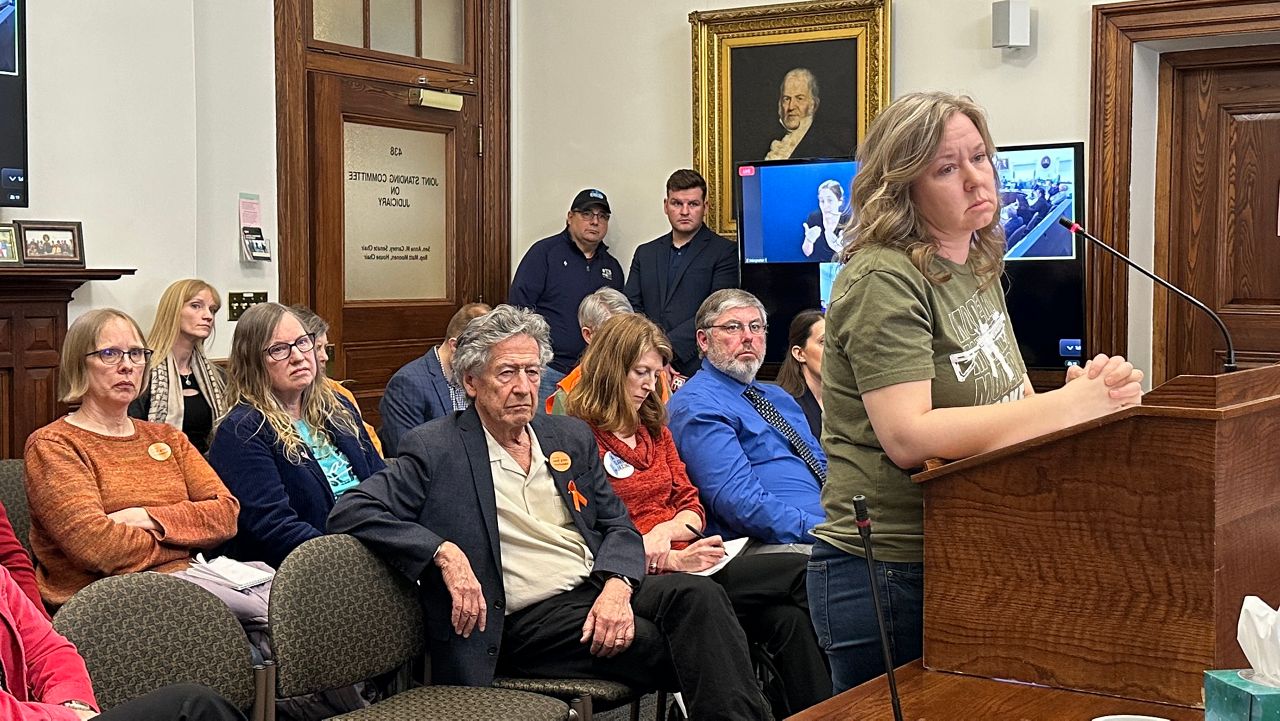Dozens of Mainers came to the State House Friday — and more than 300 submitted written testimony — to weigh-in on a bill to create a “red flag” system that makes it easier for family and police to take firearms away from those considered dangerous.
House Speaker Rachel Talbot Ross (D-Portland) is the sponsor of LD 2283, which she described as a companion to, not a replacement of, the state’s current “yellow flag” law also known as an extreme risk protection order.
“Our constituents have reminded us that these efforts are long overdue,” Talbot Ross said before the Judiciary Committee. “Gun violence is a public health crisis and it is growing.”
She said the rate of gun deaths in Maine has grown 41% from 2012 to 2021. Most of those are suicides, she said.
Her new bill allows family, a household member, or police to petition the court for a crisis intervention order.
The order “restrains the purchase, possession or control of a firearm” and may be sought “if a person is suspected of posing a significant danger of causing severe harm to the person or another person.”
The Oct. 25 mass shootings in Lewiston that claimed the lives of 18 and wounded 13 at a bowling alley and a bar prompted the proposed changes in what some call Maine’s weak gun laws.
But opponents of the new bills say they wouldn’t have prevented the mass shootings and would take away the rights of law-abiding gun owners.
“This bill is a solution looking for a problem in this state that is already solved,” said Joshua Raines of Wells, who testified against the bill.
The Maine Gun Safety Coalition described the Talbot Ross bill as an answer to the public outcry for action following the Lewiston shootings.
“We can’t wait for another tragedy,” Nacole Palmer, executive director of the coalition said. “We can’t continue to do nothing while Maine families are losing loved one after loved one to firearm suicide.”
The new bill, which comes with just two weeks to go in the legislative session, goes further than the proposal from Gov. Janet Mills offered following the Lewiston shootings.
Mills’ proposal is to amend the state’s existing law to allow police to request a warrant from a judge even if they haven’t had personal contact with someone suspected of being a danger.
That’s the approach favored by the Maine Chiefs of Police Association, which testified in opposition to the red flag bill.
Auburn Police Chief Jason Moen, interim president of the association, said in written testimony that the Mills approach “allows additional pathways for law enforcement to seize weapons if they determine there is a significant threat.”

It also implements violence prevention programs and beefs up mental health and substance use disorder services.
“We should allow for these changes to be implemented and put into practice before entertaining a different approach to preventing gun violence,” Moen wrote.
He also expressed concern that the “red flag” bill would make it easier for an ex-spouse to take away someone’s firearms under false pretenses.
Talbot Ross tried to address some of those concerns by suggesting possible amendments to the bill on Friday, including raising the burden of proof from a preponderance of evidence to “clear and convincing” evidence before a judge can order firearms to be removed.
She also suggested expanding the list of items that could be confiscated to include other types of weapons, not just firearms.
The major difference between the current yellow flag law and proposed red flag law is that the red flag process does not require someone to be mentally ill before their firearms are removed.
“Let’s face it,” said Betsey Remage-Healey of Peaks Island. “I know, you know, we all know that not every person in danger of harming themselves or others is mentally ill.”
She said an “angry spouse, mean drunk” or impulsive teenager might need to have their guns taken away temporarily if they present a danger.
In a recent report, a commission investigating the Lewiston shootings found that the Sagadahoc County Sheriff’s Office had ample evidence to put Maine’s existing yellow flag law into action to take shooter Robert Card, 40, of Bowdoin, into custody before the killings.
For months, Card exhibited mental health issues, including a two-week stay at a psychiatric hospital in New York and threats against his Army reserve unit in Saco.
The sheriff’s office told the commission that it worked with Card’s family in hopes that they would remove his firearms but did not follow up to ensure that it happened.
However, the report stopped short of recommending legislative changes to the current law.
That lack of a recommendation from the commission is one of the reasons Anne Amadon of Skowhegan opposes the red flag bill. As she waited to testify, Amadon said the state’s current yellow flag law is sufficient.
“We have to use common sense and we have to deal with the mental health issues we have in this state and we have to remember that we are still a state and a country with a Constitution and a Bill of Rights and they have to be upheld,” she said.



